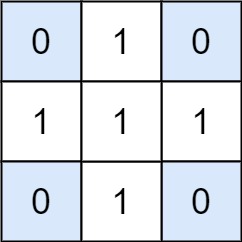Given a matrix and a target, return the number of non-empty submatrices that sum to target.
A submatrix x1, y1, x2, y2 is the set of all cells matrix[x][y] with x1 <= x <= x2 and y1 <= y <= y2.
Two submatrices (x1, y1, x2, y2) and (x1', y1', x2', y2') are different if they have some coordinate that is different: for example, if x1 != x1'.
Input: matrix = [[0,1,0],[1,1,1],[0,1,0]], target = 0 Output: 4 Explanation: The four 1x1 submatrices that only contain 0.
Input: matrix = [[1,-1],[-1,1]], target = 0 Output: 5 Explanation: The two 1x2 submatrices, plus the two 2x1 submatrices, plus the 2x2 submatrix.
Input: matrix = [[904]], target = 0 Output: 0
1 <= matrix.length <= 1001 <= matrix[0].length <= 100-1000 <= matrix[i] <= 1000-10^8 <= target <= 10^8
use std::collections::HashMap;
impl Solution {
pub fn num_submatrix_sum_target(matrix: Vec<Vec<i32>>, target: i32) -> i32 {
let m = matrix.len();
let n = matrix[0].len();
let mut matrix = matrix;
let mut count = HashMap::new();
let mut ret = 0;
for x1 in 0..m {
for x2 in x1..m {
count.insert((x1, x2, 0), 1);
}
}
for x2 in 0..m {
for y2 in 0..n {
if x2 > 0 {
matrix[x2][y2] += matrix[x2 - 1][y2];
}
if y2 > 0 {
matrix[x2][y2] += matrix[x2][y2 - 1];
}
if x2 > 0 && y2 > 0 {
matrix[x2][y2] -= matrix[x2 - 1][y2 - 1];
}
for x1 in 0..=x2 {
let mut diff = matrix[x2][y2];
if x1 > 0 {
diff -= matrix[x1 - 1][y2];
}
ret += *count.get(&(x1, x2, diff - target)).unwrap_or(&0);
*count.entry((x1, x2, diff)).or_insert(0) += 1;
}
}
}
ret
}
}